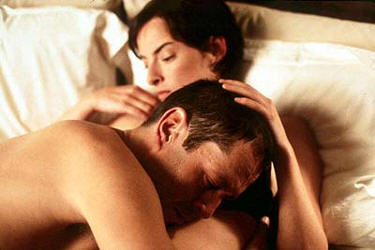 |


|
|
The Five Senses
|
|
Film Reviews by John Demetry
Waters propels through this tale of Baltimore cinema terrorists who swear an oath of celibacy for cinema; the resulting restraint makes this Waters' sexiest, funniest film. Led by the title character (Stephen Dorff's clever, punk riff on Waters' own persona), they kidnap a Hollywood starlette, Honey Whitlock (Melanie Griffith), and force her to star in their guerilla production. Waters' semi-autobiographical romp explores his own filmmaking past while explicating his artistic and poltical growth. DeMented's real-life, one-take aesthetic evokes early Waters, but Waters tells DeMented's story through breakneck montage. It's the visual equivalent of the hip-hop sampling of classic Hollywood scores that opens the picture. The title of DeMented's film, Raving Beauty, recalls Armond White's acclaim for Grifffith's "ravaged humanity" that redeemed Larry Clark's Another Day In Paradise. Griffith's real-life image--and neglected talent--becomes the crux of Waters' rich satire.
That's why he glories in Griffith's complicated performance. At first, Griffith shows Honey as a bitch exhibiting faux graciousness to her public. Then, as a complacent kidnap victim, she lazily drinks martinis and plays mom to the revolutionaries. Portaying the raving beauty in DeMented's film, she's a pro. By the end, the role completely possesses her. Griffith acts out her revenge on the culture that dismissed her as a ditz; it's a liberating, moving spectacle. By celebrating Griffith's ravaged humanity and raving beauty, Waters executes his most radical gesture. The Five Senses The 1999 Toronto Film Festival awarded American Beauty Best Feature and honored The Five Senses with Best Canadian Feature. Call it “Canadian Beauty”. Writer-director Jeremy Podeswa (Eclipse) engineers a surface-level ambiguity to hoodwink audiences. He mounts The Five Senses with the same somber lighting and belabored compositions that gave American Beauty the false whiff of art.
 Philippe Volter and Pascale Bussieres in The Five Senses
Philippe Volter and Pascale Bussieres in The Five Senses
Podeswa orchestrates the narrative around five characters, each of whom represent one of the five senses, and their relationship to the disappearance of a little girl. This structure allows Podeswa to create the impression of an intimate epic. Consequently, the scenes never achieve a satisfying dramatic arch. The mostly talented actors seem constrained, failing to develop believable or meaningful characters. Whereas last year's Magnolia strung together a series of vacuous dramatic high-points, The Five Senses never gets beyond the teasing stage. It makes cheap the child in jeopardy cliché-the narrative's emotional glue-in a movie whose subtext is various forms of voyeurism, and by extension, cinema. You might find yourself squirming uncomfortably as characters watch news reports concerning the missing girl. The movie provides its own descriptive metaphor: Mary-Louise Parker plays a cake decorator whose elaborately designed cakes leave a bad taste. The most intriguing character epitomizes what Podeswa sacrifices in his lazy narrative scheme. Brendan Fletcher plays a voyeur who gets off watching people hook up in a park. Fletcher delivers a full-lipped performance that recalls the way Brendan Sexton, Jr. seduced audiences when he threatened to rape Heather Matarazzo after school in Welcome to the Dollhouse. He bonds with another young voyeur, Nadia Litz (think Christina Ricci on Quaaludes). Wonderment plays across their faces when she requests that he play a cross-dressing game The image of Fletcher-black wig and lingerie against pale white skin with a burst of red lips--playfully integrates with the rest of the film's high-toned palette. The moment also coalesces the film's underdeveloped themes of sensuality, identity, and sexuality, accented by a shot of Fletcher kissing himself in a cracked mirror, leaving a lipstick print much as this sequence marks Podeswa's cracked narrative. Examining his metamorphosis, Litz asks Fletcher how he feels. He responds: "Mysterious from the head up. Exotic from the neck down." It's a rare hardwon bit of stylized dialogue. The scene smolders, nearly melting away Podeswa's icy pretensions. |

© 1997-2000 BEI
 The cast of Cecil B. DeMented
The cast of Cecil B. DeMented